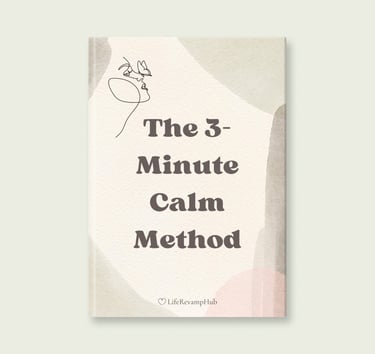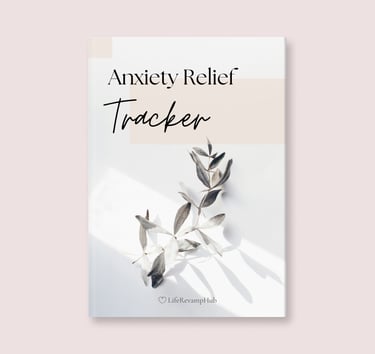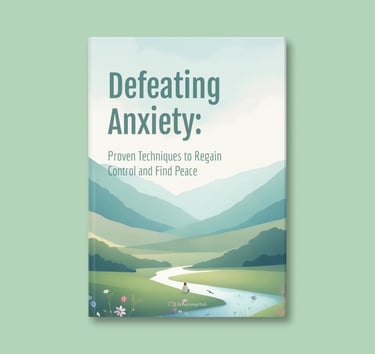Understanding the Root Causes of Anxiety: Why We Feel This Way & How to Regain Control
1/2/20253 min read
Anxiety is more than just feeling stressed—it’s a complex emotional and physiological response that can be triggered by multiple factors. Whether it’s work pressure, past experiences, or even genetics, understanding what causes anxiety is the first step toward managing it effectively.
In this post, we’ll break down the scientifically-backed causes of anxiety and how you can start regaining control.
🧠 1. Biological & Genetic Factors
Some people are naturally more prone to anxiety due to brain chemistry and genetics. Studies show that:
• An overactive amygdala (the fear center of the brain) can cause heightened anxiety responses.
• Low serotonin & GABA levels (brain chemicals that regulate mood) are linked to anxiety disorders.
• Genetics play a role—if your parents or close relatives have anxiety, you may be more susceptible.
✅ What to Do:
• Try exercise, mindfulness, and nutrition to support brain chemistry.
• If anxiety is severe, consult a professional about therapy or medical options.
😰 2. Chronic Stress & Lifestyle Triggers
Modern life is filled with high-pressure situations that can lead to chronic anxiety. Some common triggers include:
• Work overload & deadlines
• Financial stress
• Lack of sleep & poor diet
• Social media overstimulation
✅ What to Do:
• Set boundaries at work to prevent burnout.
• Reduce caffeine & sugar intake to avoid worsening anxiety symptoms.
• Prioritize sleep & self-care to support emotional balance.
⚡ 3. Past Trauma & Unresolved Emotional Wounds
Emotional experiences from the past—especially traumatic ones—can create long-term anxiety patterns. These may include:
• Childhood neglect or abuse
• A past toxic relationship
• PTSD from a stressful event
✅ What to Do:
• Consider therapy or journaling to process emotions.
• Practice self-compassion and inner healing techniques.
💭 4. Negative Thought Patterns & Overthinking
Anxiety is often fueled by distorted thinking, including:
• Catastrophizing (“What if the worst happens?”)
• Perfectionism (“I must do everything right, or I’m a failure.”)
• Fear of judgment (“Everyone is watching and criticizing me.”)
✅ What to Do:
• Challenge your thoughts with Cognitive Behavioral Therapy (CBT) techniques.
• Use affirmations & mindfulness to break the overthinking cycle.
🦠 5. Physical Health & Hormonal Imbalances
Surprisingly, your body’s physical health can also trigger anxiety:
• Thyroid imbalances (hyperthyroidism can mimic anxiety symptoms).
• Vitamin deficiencies (low B12, D, or magnesium levels can increase anxiety).
• Gut health issues (since the gut-brain connection impacts mood).
✅ What to Do:
• Get bloodwork done to rule out medical causes.
• Support your nervous system with a healthy diet, hydration, and movement.
🌟 Final Thoughts: Awareness is the First Step to Healing
Understanding what triggers your anxiety is the key to reducing its power over you. Whether it’s lifestyle, past trauma, or biology, there are science-backed ways to regain control.
The 3-Minute Stress Relief Kit
Powered by alpha wave signals, it is designed to calm you fast in real-life stress moments. Just press play - reset and step back with confidence and ease, anytime, anywhere.
Guided Breathing Sessions
The 3-Minute Calm Method
The 3-Minute Calm Method is your instant solution to stop panic, reset your mind, and regain control—anytime, anywhere.
FREE EBOOK
The Anxiety Relief Tracker
Take the first step toward a calmer mind with this tracker designed to help you track your thoughts and develop healthier coping strategies.
FREE EBOOK
Defeating Anxiety: Proven Techniques to Regain Control and Find Peace
Your practical guide to understanding, managing, and overcoming anxiety—with proven techniques, real-life strategies, and simple steps to help you regain control and find lasting peace.
E-book
LifeRevampHub © 2025 All Rights Reserved.








